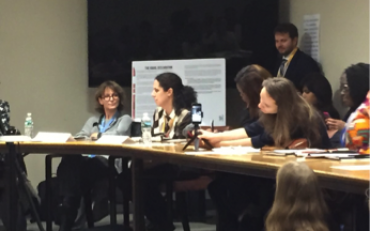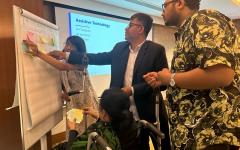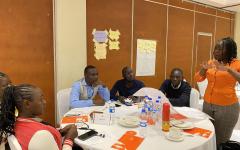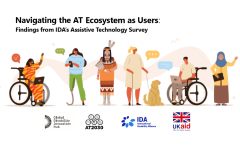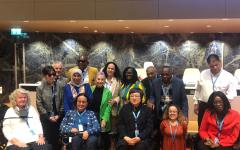For CSW62 from March 12th-23rd, 2018, IDA supported the participation of Ms Robinah Alambuya representing the World Network of Users and Survivors of Psychiatry (WNUSP), contributed to development and organisation of four parallel events and advocated for strong disability inclusion within the Agreed Conclusions for CSW.
“Rural Women with Disabilities”
The Republic of Korea alongside Sweden, and the State of Qatar hosted a parallel event highlighting the challenges and opportunities of “Rural Women with Disabilities” H.E. Ambassador Chull-joo Park opened the session reaffirming the “Republic of Korea’s commitment to truly leaving no one behind and that more so than any population, women and girls with disabilities living in rural areas are the most disenfranchised and invisible.” IDA contributed to the panel and highlighted that it is critical for States to implement census and data collection initiatives, and to utilized established and widely accepted methodologies, such as the Washington Group Short Set of questions, to increase the accuracy of data on women and girls with disabilities in rural areas. Further emphasizing that it is not enough for policies and programmes to generally include persons with disabilities, States and civil society actors must take targeted action to truly reach and address the barriers faced by women and girls with disabilities living in remote and rural areas.
“Closing the Gender Gap: Achieving Gender Parity in UN human rights bodies”
The GQUAL Campaign, Center for Justice and International Law (CEJIL), International Development Law Organization (IDLO), International Disability and Development Consortium (IDDC), and the International Disability Alliance (IDA) organized a parallel event “Closing the Gender Gap: Achieving Gender Parity in UN human rights bodies” focused on achieving gender parity representation in international tribunals, monitoring and adjudicatory bodies, including the Committee on the Rights of Persons with Disabilities. Ms.Ana Pelaez Narvaez, candidate for the CEDAW Committee, opened the event emphasising the critical importance that “We need to have a gender perspective to support the global movement and to ensure the gender balance and perspective” and that “the gender movement has not been fully inclusive, and so it is the time now to ensure the intersectionality and multiple identities of all women are represented on treaty bodies.” The priority of ensuring gender parity and disability inclusion in the treaty bodies was further reinforced by Mamadou Tangara, Permanent Representative of Gambia to the United Nations and Chair of the African Union, who noted that that “Disability can no longer be sidelined as a marginal group, disability intersects with all groups of people, and so this along with gender must be represented within monitoring human rights.”
Ana Palaez Candidate Reception
The Spanish Mission hosted a reception to promote the candidature of Ms Ana Palaez, former CRPD member and current candidate for CEDAW, with speeches being made by the Minister of Health, Social Services and Equality Dolores Montserrat, H.E D. Jorge Moragas Sanchez, and Vladimir Cuk, Executive Director IDA.Vladimir Cuk opened the reception by congratulating Spain on promoting much needed diversity in the CEDAW committee and that both the gender movement and the disability movement have marginalized women with disabilities, and now is the time with Ana Palaez’s campaign to bring together the two movements.
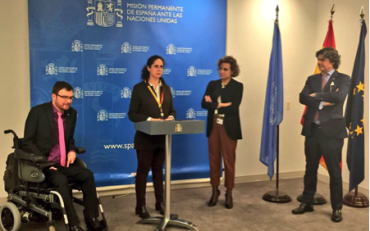
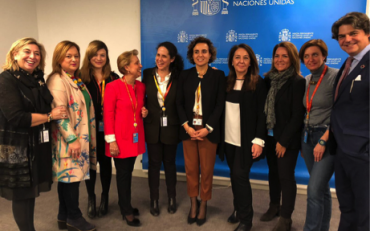
Ana Palaez called on election officers and representatives in the room to encourage their states to consider gender parity within the committees.
“Advocacy on the margins: Women with disabilities addressing violence at the grassroots level”
IDA alongside Humanity and Inclusion/Making It Work Gender and Disability Project, and the Disability Rights Fund co-organised a parallel event during the second week of CSW“Advocacy on the margins: Women with disabilities addressing violence at the grassroots level”
The event brought together women leaders with disabilities from grassroots communities in Africa to share their work to combat gender-based violence against women and girls with disabilities in rural communities. The speakers included Florence Ndong: Executive Director of Lira District Disabled Women’s Association in Lira, Uganda; Robinah Alambuya: Co-founder and Executive Director of Triumph Uganda Mental Health Support and Recovery Program, an organization of persons with psycho-social disabilities and Board member of the World Network of Users and Survivors of Psychiatry and Gaudence Mushimiyimana: Executive Director of Umuryango Nyarwanda w’Abagore Bafite Ubumuga (UNABU), the Rwanda Organization of Women with Disabilities.
Robinah Alambuya highlight the unique barriers and types of violence women and girls with psychosocial disabilities experience with regard to gender based violence and access to justice. “Women and girls with psychosocial disabilities are assumed to be unreliable, dishonest and promiscuous. Even when a woman or girl is stable and has full control and integrity with her disability, no one believes her, and her family or partner that is often the abuser, is given full legal and social power over her.” Ms. Alambuya further shared about what it means to have “supported decision making” and how this was critical for persons with psychosocial disabilities, particularly women and girls. “We give women and families the education they need to support her when she is in crises, and to support her autonomy and human rights”
Co-facilitated by Shena Cavallo, Program Officer, International Women’s Health Coalition, the event outlined inclusive strategies to prevent and respond to gender-based violence, from each of their unique areas of work, and Ms. Cavallo raised questions regarding how the gender movement and disability movement could collaborate to ensure greater inclusion of women and girls with disabilities.
Agreed Conclusions
Through advocacy and partnership with Member States and the Women’s Rights Caucus (NGO coordination group), the Agreed Conclusions include two stand-alone paragraphs on the urgent need for States to promote and protect the rights of women and girls with disabilities in rural areas, highlighting access to services, justice, decent employment, education, sexual and reproductive health and must be actively involved in decision-making processes. Additionally, the agreed conclusions highlight concern that women and girls with disabilities, particularly those living in rural and remote areas experience stigmatization and an increased risk of violence, exploitation and abuse.
In addition, the Agreed Conclusions ask for the strengthening of data collection and disaggregation, including disability, and uses inclusive and accessible language throughout.
